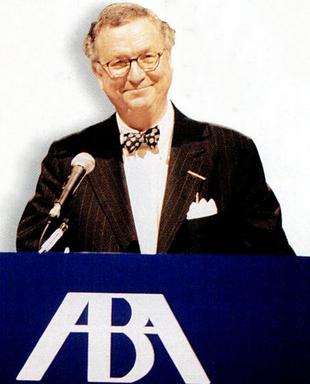Former ABA President Philip S. Anderson dies at 88

Former ABA President Philip S. Anderson Jr. of Little Rock, Arkansas, died Tuesday at age 88. File photo from the October 1998 issue of the ABA Journal.
Updated: Former ABA President Philip S. Anderson Jr. of Little Rock, Arkansas, died Tuesday at age 88. Anderson died of complications from Alzheimer’s disease, his family said.
Anderson was a talented orator, “a perfect gentleman,” a mentor to others and a “natural for law practice” who was “completely at ease in the courtroom,” Anderson’s friends and colleagues told the Northwest Arkansas Democrat-Gazette.
Anderson was known for his bow ties, although he did not wear them during jury trials to avoid anything that could be distracting, according to Peter Kumpe, a lawyer who founded Williams & Anderson in 1988 with Anderson and two other lawyers.
Anderson was ABA president from 1998 to 1999 and was chairman of the ABA House of Delegates from 1992 to 1994, according to an obituary published by the Ruebel Funeral Home.
He also was on the ABA Board of Governors for two terms, was chair of the ABA Section of Legal Education and Admissions to the Bar, and was chair of the ABA Coalition for Justice, according to a 1999 article in the Bar Leader. The coalition sought to strengthen confidence in the U.S. justice system.
As he began his term as ABA president in Toronto, Anderson said he would be stressing judicial independence, professional independence for lawyers, immigrant rights and equality within the profession. He also expressed concern about the lack of civics education.
During his term, Anderson announced the formation of the ABA Commission on Multidisciplinary Practice to address concerns about accounting firms making inroads into the legal profession. As his term ended, Anderson succeeded in bringing former President Bill Clinton to the ABA Annual Meeting in Atlanta.
Anderson’s father-in-law was also a president of the ABA.
One of Anderson’s daughters, Sidney Anderson Kenyon, told the ABA Journal that Anderson’s ABA work was important to him.
“Dad loved the ABA,” Kenyon says. “Dad loved the committee work, he loved the people, he had friends all over the country, and he loved the staff.”
One staff member she mentioned, “Alpha,” was a reference to Alpha Brady, the newly named executive director of the association.
Kenyon remembered that the family was with Anderson when he became ABA president in Toronto and remembered her mother helping secure the theater where Clinton would speak in Atlanta. Clinton had worked with Anderson at the law firm where he initially practiced law.
“Dad was a Clinton supporter forever,” Kenyon says.
Kenyon says her father “loved the law and what the law represents in this country.”
He was never without his copy of a pocket Constitution that he carried in his breast pocket.
Anderson told the Bar Leader that his interest in being a lawyer developed at a young age.
“It always seemed to me that lawyers have had a very important role to play in our society,” he said. “We are a country that is devoted to the rule of law.”
Anderson spent part of his childhood in Oak Ridge, Tennessee, where the atomic bomb was developed. Anderson’s father helped design and build the town as an officer in the Army Corps of Engineers, according to the Northwest Arkansas Democrat-Gazette.
Anderson delivered Knoxville, Tennessee, newspapers there. One customer, Robert Oppenheimer—the father of the atomic bomb—was his favorite because he was the only person who prepaid.
Anderson attended college and law school at the University of Arkansas. He was the editor-in-chief of the Arkansas Law Review. In college, Anderson was a political cartoonist for the campus newspaper and co-editor of an underground publication that was shut down after five issues.
Anderson is survived by Kenyon and two other children: Philip Wright Anderson and Kate Anderson Askew. His wife, Missy Wright Anderson, died in 2011. The couple had been married for 52 years.
ABA President Mary Smith commented on Anderson’s death in an Aug. 16 statement.
“The American Bar Association mourns the passing of former President Philip S. Anderson Jr.,” Smith wrote. “The ABA has been fortunate over its history to have individuals dedicated to the legal profession and the rule of law who have selflessly served as its president. Phil Anderson was a practicing lawyer who set the bar high when it came to professionalism and ethics, devotion to the improvement of the American justice system, and service to the organized bar.”
Updated Aug. 16 at 4:20 p.m. to include the statement from ABA President Mary Smith.



